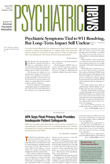It appears that children were profoundly affected by the events of 9/11, both in New York City and Washington, D.C.
Charles Hoge, M.D., a psychiatrist and researcher at the Walter Reed Army Institute of Research, noted in a letter to the editor in the August 8 New England Journal of Medicine that “there were significant increases in the number of visits for anxiety disorders and acute stress reactions in children” of military personnel who lived within 50 miles of Washington, D.C., and used military mental health clinics.
Visits for anxiety disorders, according to Hoge, increased in children of military parents by 46 percent in the 22 weeks following the terrorist attacks on the World Trade Center and the Pentagon, compared with the same period in each of the previous two years. Visits for acute and posttraumatic stress reactions rose by 50 percent, Hoge said, and children were seen for adjustment reactions 29 percent more often during this 22-week period than in the same period during the two previous years.
Researchers at the New York Academy of Medicine came to the same conclusion regarding children in the New York metropolitan area. In a report that appeared in the July 1 Psychiatric Services, Jennifer Stuber, Ph.D., a researcher in the academy’s center for Urban Epidemiological Studies, said that nearly one in four Manhattan children received counseling in the month following September 11. Children whose parents suffered symptoms indicative of severe stress were most likely to have received counseling.
In a press release describing the study, which culled the data from the academy’s random-digit dialing survey of more than 1,000 Manhattan residents, Stuber said the study raised questions about how accurately parents assess their children’s need for mental health care. She indicated that the actual prevalence of stress symptoms in the cohort of children is most likely significantly higher.
“Parents have been shown to underestimate their kid’s distress,” Stuber said. The point is critical because “this assessment often determines whether or not a child receives counseling.”
David Fassler, M.D., APA trustee-at-large and a child and adolescent psychiatrist in Burlington, Vt., told Psychiatric News, “As the anniversary approaches, we can anticipate that some children and adolescents will re-experience aspects of the stress associated with last year’s tragedies.” It is important to note, he said, that such reactions are normal and expected. Children may experience reactions similar to those they endured a year ago, including appearing tense and irritable, having trouble sleeping or experiencing nightmares, having obsessive thoughts, and refusing to attend school on the anniversary.
Fassler advises parents to be open and honest with their children about the anniversary and any feelings that it may provoke.
“The tragic events of 9/11 will always be a part of our lives and the lives of our children. Fortunately,” Fassler emphasized, “children are naturally resilient and will handle the anniversary in stride.”
